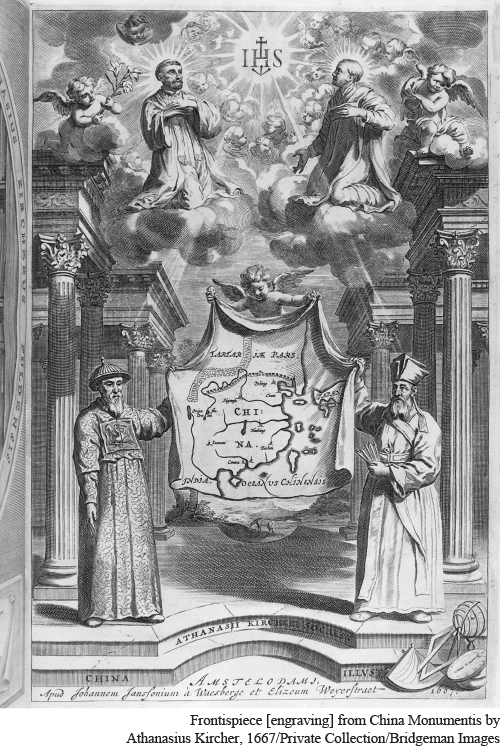An Asian Comparison: China and the Jesuits
The Chinese encounter with Christianity was very different from that of Native Americans in Spain’s New World empire. The most obvious difference was the political context. The peoples of Spanish America had been defeated, their societies thoroughly disrupted, and their cultural confidence sorely shaken. China, on the other hand, encountered European Christianity between the sixteenth and eighteenth centuries during the powerful and prosperous Ming (1368–1644) and Qing (1644–1912) dynasties. Although the transition between these two dynasties occasioned several decades of internal conflict, at no point was China’s political independence or cultural integrity threatened by the handful of European missionaries and traders working there.
Guided Reading Question
▪COMPARISON
Why were missionary efforts to spread Christianity so much less successful in China than in Spanish America?

The reality of a strong, independent, confident China required a different missionary strategy, for Europeans needed the permission of Chinese authorities to operate in the country. Whereas Spanish missionaries working in a colonial setting sought primarily to convert the masses, the leading missionary order in China, the Jesuits, took deliberate aim at the official Chinese elite. Following the example of their most famous missionary, Matteo Ricci (in China 1582–1610), many Jesuits learned Chinese, became thoroughly acquainted with classical Confucian texts, and dressed like Chinese scholars. Initially, they downplayed their mission to convert and instead emphasized their interest in exchanging ideas and learning from China’s ancient culture. As highly educated men, the Jesuits carried the recent secular knowledge of Europe — science, technology, geography, mapmaking — to an audience of curious Chinese scholars. In presenting Christian teachings, Jesuits were at pains to be respectful of Chinese culture, pointing out parallels between Confucianism and Christianity rather than portraying it as something new and foreign. They chose to define Chinese rituals honoring the emperor or venerating ancestors as secular or civil observances rather than as religious practices that had to be abandoned. Such efforts to accommodate Chinese culture contrast sharply with the frontal attacks on Native American religions in the Spanish Empire undertaken by many missionaries.
AP® EXAM TIP
You should know about some of the scientific and religious contributions of Jesuit missionaries in China.
The religious and cultural outcomes of the missionary enterprise likewise differed greatly in the two regions. Nothing approaching mass conversion to Christianity took place in China, as it had in Latin America. During the sixteenth and seventeenth centuries, a modest number of Chinese scholars and officials did become Christians, attracted by the personal lives of the missionaries, by their interest in Western science, and by the moral certainty that Christianity offered. Jesuit missionaries found favor for a time at the Chinese imperial court, where their mathematical, astronomical, technological, and mapmaking skills rendered them useful. For more than a century, they were appointed to head the Chinese Bureau of Astronomy. Among ordinary people, Christianity spread very modestly amid tales of miracles attributed to the Christian God, while missionary teachings about “eternal life” sounded to some like Daoist prescriptions for immortality. At most, though, missionary efforts over the course of some 250 years (1550–1800) resulted in 200,000 to 300,000 converts, a minuscule number in a Chinese population approaching 300 million by 1800. What explains the very limited acceptance of Christianity in early modern China?
Fundamentally, the missionaries offered little that the Chinese really wanted. Confucianism for the elites and Buddhism, Daoism, and a multitude of Chinese gods and spirits at the local level adequately supplied the spiritual needs of most Chinese. Furthermore, it became increasingly clear that Christianity was an all-or-nothing faith that required converts to abandon much of traditional Chinese culture. Christian monogamy, for example, seemed to require Chinese men to put away their concubines. What would happen to these deserted women?
By the early eighteenth century, the papacy and competing missionary orders came to oppose the Jesuit policy of accommodation. The pope claimed authority over Chinese Christians and declared that sacrifices to Confucius and the veneration of ancestors were “idolatry” and thus forbidden to Christians. The pope’s pronouncements represented an unacceptable challenge to the authority of the emperor and an affront to Chinese culture. In 1715, an outraged Emperor Kangxi wrote:
I ask myself how these uncultivated Westerners dare to speak of the great precepts of China…. [T]heir doctrine is of the same kind as the little heresies of the Buddhist and Taoist monks…. These are the greatest absurdities that have ever been seen. As from now I forbid the Westerners to spread their doctrine in China; that will spare us a lot of trouble.9
This represented a major turning point in the relationship of Christian missionaries and Chinese society. Many were subsequently expelled, and missionaries lost favor at court.
In other ways as well, missionaries played into the hands of their Chinese opponents. Their willingness to work under the Manchurian Qing dynasty, which came to power in 1644, discredited them with those Chinese scholars who viewed the Qing as uncivilized foreigners and their rule in China as disgraceful and illegitimate. Missionaries’ reputation as miracle workers further damaged their standing as men of science and rationality, for elite Chinese often regarded miracles and supernatural religion as superstitions, fit only for the uneducated masses. Some viewed the Christian ritual of Holy Communion as a kind of cannibalism. Others came to see missionaries as potentially subversive, for various Christian groups met in secret, and such religious sects had often provided the basis for peasant rebellion. Nor did it escape Chinese notice that European Christians had taken over the Philippines and that their warships were active in the Indian Ocean. Perhaps the missionaries, with their great interest in maps, were spies for these aggressive foreigners. All of this contributed to the general failure of Christianity to secure a prominent presence in China.